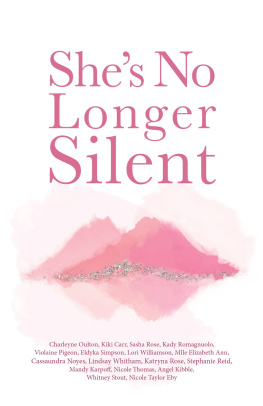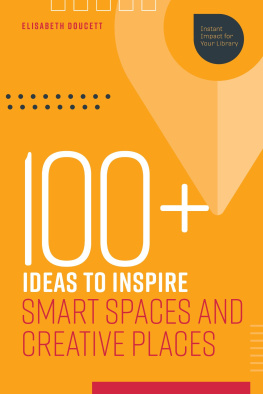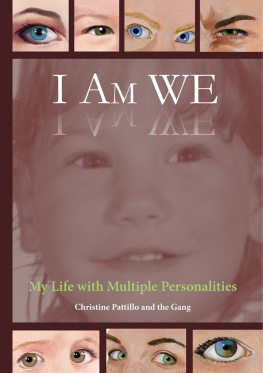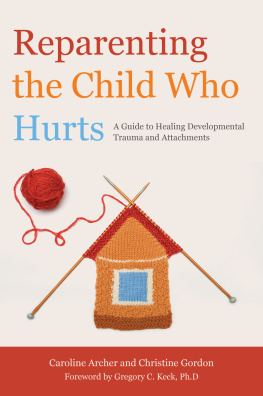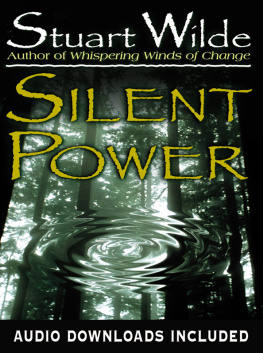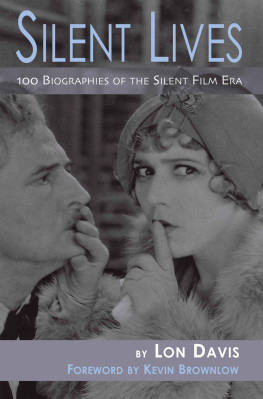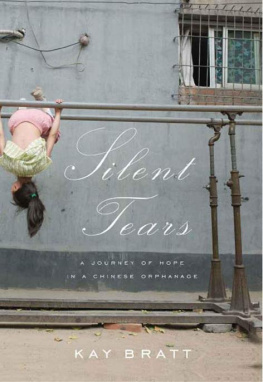All the Silent Spaces

Copyright 2019 Christine Ristaino
All rights reserved. No part of this publication may be reproduced, distributed, or transmitted in any form or by any means, including photocopying, recording, digital scanning, or other electronic or mechanical methods, without the prior written permission of the publisher, except in the case of brief quotations embodied in critical reviews and certain other noncommercial uses permitted by copyright law. For permission requests, please address She Writes Press.
Published 2019
Printed in the United States of America
ISBN: 978-1-63152-569-8 pbk
ISBN: 978-1-63152-570-4 ebk
Library of Congress Control Number: 2019931206
For information, address:
She Writes Press
1569 Solano Ave #546
Berkeley, CA 94707
Interior design by Tabitha Lahr
She Writes Press is a division of SparkPoint Studio, LLC.
All company and/or product names may be trade names, logos, trademarks, and/or registered trademarks and are the property of their respective owners.
Please note: all names and some details in this book have been changed to protect the identities of the real people I have written about.
I dedicate this book to my children, Maddy and Benny, to my husband, Christopher, to my parents and brothers, Carl, Jean, Carl, Phil, Andy, and Mark, to my nieces and nephews, Margaret, Isabella, Dylan, Carter, and Harley, to my inspirational students, and to Isabel for all the late-night talks that led me to this moment.
Contents
Introduction:
Ten Year Anniversary
I t has been ten years since the event that inspired this book occurred on a black pavement,
a bloodied woman lying in a parking lot
while her children stared and sobbed.
Since then,
the world has changed.
Its more fractured,
more united in hidden, unspoken truths
of a look, a shiver, a hope, a touch.
Now, more than ever,
we need to engage with difficult topics,
reach out to others,
listen to each other in a sea of uncertainty,
sit together with the experiences we share,
and find common ground.
It is my hope
this book will create space
for difficult conversations,
for bearing witness to each others stories,
so we will be less alone in them;
stories owned and shouldered by the world,
not just each of us, alone.
Now more than ever we need this.
More than ever we are called to take chances with our voices,
so tied as we are to each other in our shared fluency of experience.
Retrogression Defined
retrogression
noun
1. the act of retrogressing; movement backward.
2. Biology. degeneration; retrograde metamorphosis; passing
from a more complex to a simpler structure.
dictionary.reference.com/browse/retrogression
Prologue
T he shopping cart we find in the parking lot has Cinderella on it and my children think they are at Disneyland. Their chubby arms and legs move with purpose as they climb inside. As I push my children toward the store, I glance down at them. Theyre cute. I know this about my kids. My curly hair blows in the breeze, lifting and settling every few seconds near the sides of my face. When I reach the sidewalk and the wheels become stuck on the curb, a man on a bench stands and walks in our direction. I see him and acknowledge him with a nod, hoping hell help me lift the cart onto the sidewalk.
The man grabs the shopping cart with one hand and with the other he throws his fist into my face. The pain concentrates on the bridge of my nose for a second and then moves into my head. I can feel something open inside me. I smell blood as it flows out my nose.
The man is wiry. I keep my hands on the cart, wanting to create space underneath for my children, who are somewhere below me.
Something isnt right with my shoulder. All the ligaments, muscles, and skin are pulling off the bone and the bone itself seems to move away from the socket. Each time it is pulled, I feel a wave of nausea. I want to crouch low to the ground and nurse my arm, but my children are below. I squeeze the cart, almost touching my palms to my fingers.
I stare at the mans face. It is angular, thin. It does not smile. The lips press themselves together, wormy, contemptuous. I hear a crack. It sounds like the snap of a chicken bone. This time its my jaw. The force brings my head back. My neck hits my shoulders. Another wave of nausea, and something wirelike pulls against my arm. Its my purse strap. It must be caught on the cart. I thrust my shoulder back to keep it in place, and this brings on searing pain.
He moves closer. His breath is sour. Theres blood on his face and hand. He tries to yank my purse from me. So thats what this is about.
Youre a prick, I say and his eyes move away from mine.
He steps back and then his fist strikes my right eye. I am retching. The muscles in both arms ache with this new force. I let go of the cart and cover my face with my hands. The purse strap slides off my shoulder. Im falling. Theres the thud of my own head and a sharp pain where it hits the pavement. Dots appear and disappear in front of mean electrical current, the wiring all wrong. Blood creeps through the cracks in my hands, and then I hear his footsteps as they recede, and look to see my two children inches away, staring from the princess cart. I can feel the cold blacktop on my skin. I hear a child wailing. Its my daughter. I am covered in my own blood. I want to close my eyes.
Retrogression 1:
September 17, 2007, 2:30 p.m.
It is the Monday after the attack. I am at a meeting with the second highest ranking official at my university, Provost Ray Stevens, a historian by training, a gentle speaker, a black man. He is talking about a trip he has recently taken and I cant remember where he went, even though he must have told us three times. It is a rare and important meeting, for we are finalizing something that will change the university in a positive way, but they are asking me about my black eye, or something about my eyes. Why wont the health center give you an appointment for a scan? they ask. Because they didnt have one available until Thursday. Suddenly Provost Stevens is on the phone and I am in a car, driving there, driving to the health center with an appointment, just like that, only I am not driving; my colleague Jackie is. Then I am at the hospital. Why did you take me here? I ask her. Because your pupils were two different sizes and you were slurring your words, she says. I dont care. I want to hear more about Jackies crazy childhood with eleven kids, or something like that, playing on the train tracks and sneaking into movie theaters.
Chapter 1:
Victims
I have heard stories from victims since my late teens. Initially I listened, but never knew how to react. When a man beat me up at the store in front of my children, stories of survival became part of who I was. Overnight, I was a member of a community. Stories tumbled into my pathway, one after another.
Zahra called me immediately after she was attacked when I was living in Seattle in my early twenties. She was badly beaten, with a black eye, a sprained ankle, a dislocated knee, and gashes to her head. I walked through her front door into the middle of a conversation.
All I hear is you apologizing for this guy. You have to call the police, her boyfriend said.
No, I cant. I promised I wouldnt.
But he could hurt somebody else, he told her.
Next page

